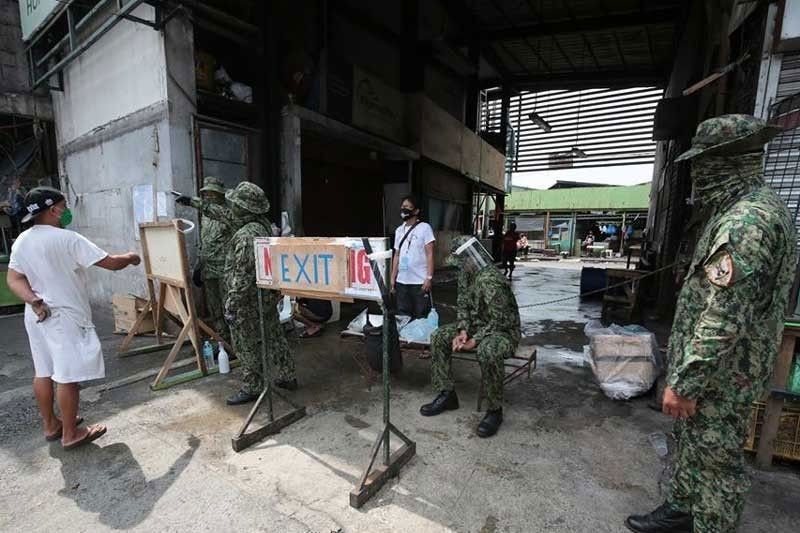Palace, DOH disagree on scrapping of COVID-19 quarantine classifications

MANILA, Philippines — Malacañang and the Department of Health (DOH) appear to be out of sync on the issue of quarantine qualifications.
Presidential spokesman Harry Roque made it clear at a press briefing yesterday that quarantine qualifications won’t be lifted, while the Department of Health (DOH) said it is studying the possibility of giving local government units (LGUs) a free hand in setting community quarantine status.
Roque’s position was contrary to an announcement recently by Interior Undersecretary Epimaco Densing that the government may do away with its periodic community quarantine classification and just let LGUs undertake “independent implementation” of pandemic response measures based on a standard policy, once the classifications cease.
“I do not have that information as the official spokesman of the IATF (Inter-Agency Task Force for the Management of Emerging Infectious Diseases) and spokesman of the President on all matters related to COVID-19,” Roque said when asked to react to Densing’s statement.
Interior Secretary Eduardo Año said the national government may scrap quarantine classifications only after the country achieves herd immunity from COVID-19.
“It’s not yet being discussed by the IATF. We have no such policy yet,” Año said in Filipino in an interview over Teleradyo.
Roque again urged officials to be careful about releasing information. “My appeal to our colleagues in government is to respect the order of our President (on the) centralized release of information to avoid confusion. My request to our colleagues in the media is if you want to clarify information, please direct your questions to our office because we respond to them and I think the Malacañang Press Corps can attest to this,” he added.
Asked about the possibility of lifting the community quarantine this year, Roque replied: “I do not know. That’s a decision to be made by the IATF.”
“Pero tingin ko po, malabo pa iyan (But I think that is still unlikely),” he added.
Officials have warned that stricter quarantine restrictions may be imposed if COVID-19 infections surge because of the public’s growing disregard for health and safety protocols.
At the same press briefing, Roque disputed the claim of Iloilo City Mayor Jerry Treñas that COVID-19 infections in the provinces are rising because the national government had allocated more vaccines to the National Capital Region Plus, an area composed of Metro Manila, Bulacan, Laguna, Cavite and Rizal.
Roque said while the IATF welcomes suggestions, it has its own pool of experts from which to draw ideas. “We do not lack experts who provide recommendations and of course, we also consider the recommendations of OCTA (Research Group). But I can assure you, we do not just listen to OCTA,” the Palace spokesman said.
Roque added that only 32.2 percent of the vaccines went to NCR Plus while the rest of pandemic shots were distributed to other parts of the country.
President Duterte has ordered agencies to ensure an equitable distribution of vaccines, he added.
“I can assure Mayor Treñas that unfortunately, when it comes to the rising number of cases, the solution is wearing face masks, washing of hands and observing physical distance. Part of the solution, of course, is the vaccine. But COVID continues to spread because some of our countrymen are not following the appeal of our President to wear face masks, wash hands frequently and observe distancing,” Roque said.
“That is an established fact and of course, we have new variants that are more transmissible,” he added.
Long-term goal
Earlier yesterday, Health Undersecretary Maria Rosario Vergeire said allowing LGUs more say in quarantine qualification is part of discussions about the COVID-19 response.
“It’s a long-term goal. It’s not going to happen now or in the next months … We just have to have this goal where we will shift into that direction where we will ease slowly our restrictions,” she said.
“If we shift the decision to implement quarantine classifications to them, we must have safeguards so that we won’t have the risk of having further transmission,” she added.
“This requires a long and thorough study. This will not happen in the next months but this is being discussed already,” she maintained.
Meanwhile, the UK-based Pantheon Macroeconomics said the Philippines will likely achieve its much needed herd immunity only by early 2023, due to the relatively slow pace of vaccination.
In discussions with The STAR, Pantheon senior Asia economist Miguel Chanco explained that the 113 million doses are only enough to fully vaccinate just 50 percent of the total population.
This is way below the 85 percent threshold that Pantheon thinks is needed to contain the more contagious Delta variant, previously known as the Indian variant.
The Philippines has set an ambitious target of 70 million Filipinos to be vaccinated by yearend, which is about 65 percent of the 110 million Filipinos.
“We also can’t take for granted that supplies will arrive smoothly. A number of ASEAN countries who have signed purchase agreements far earlier than the Philippines have already complained about delays,” Chanco said.
Latest data from the DOH showed that the Philippines has administered some 8.4 million doses.
About two percent or 2.15 million Filipinos have been fully vaccinated while those who were given at least one dose reached 6.25 million or some 5.68 percent of the population.
Chanco also explained that another issue is the capacity of the health care system to administer vaccines quickly.
So far, the country has shown a peak rate of roughly 150,000 first doses per day, a rate it has struggled to sustain.
“Rough calculation would show that the Philippines would need to vaccinate around 280,000 people – starting today – if it has any hope of achieving some semblance of herd immunity by the end of this year,” Chanco said. “At the moment, though, nothing in the data suggests this is possible.”
As COVID-19 vaccination gets delayed, so is the country’s economic recovery.
“Our current forecasts only see real GDP returning to its pre-COVID-19 level by the fourth quarter of 2022,” Chanco said.
The government said it has secured 113 million doses of COVID-19 vaccines from five manufacturers. – Sheila Crisostomo, Emmanuel Tupas, Louise Maureen Simeon, Jose Rodel Clapano
- Latest
- Trending





























